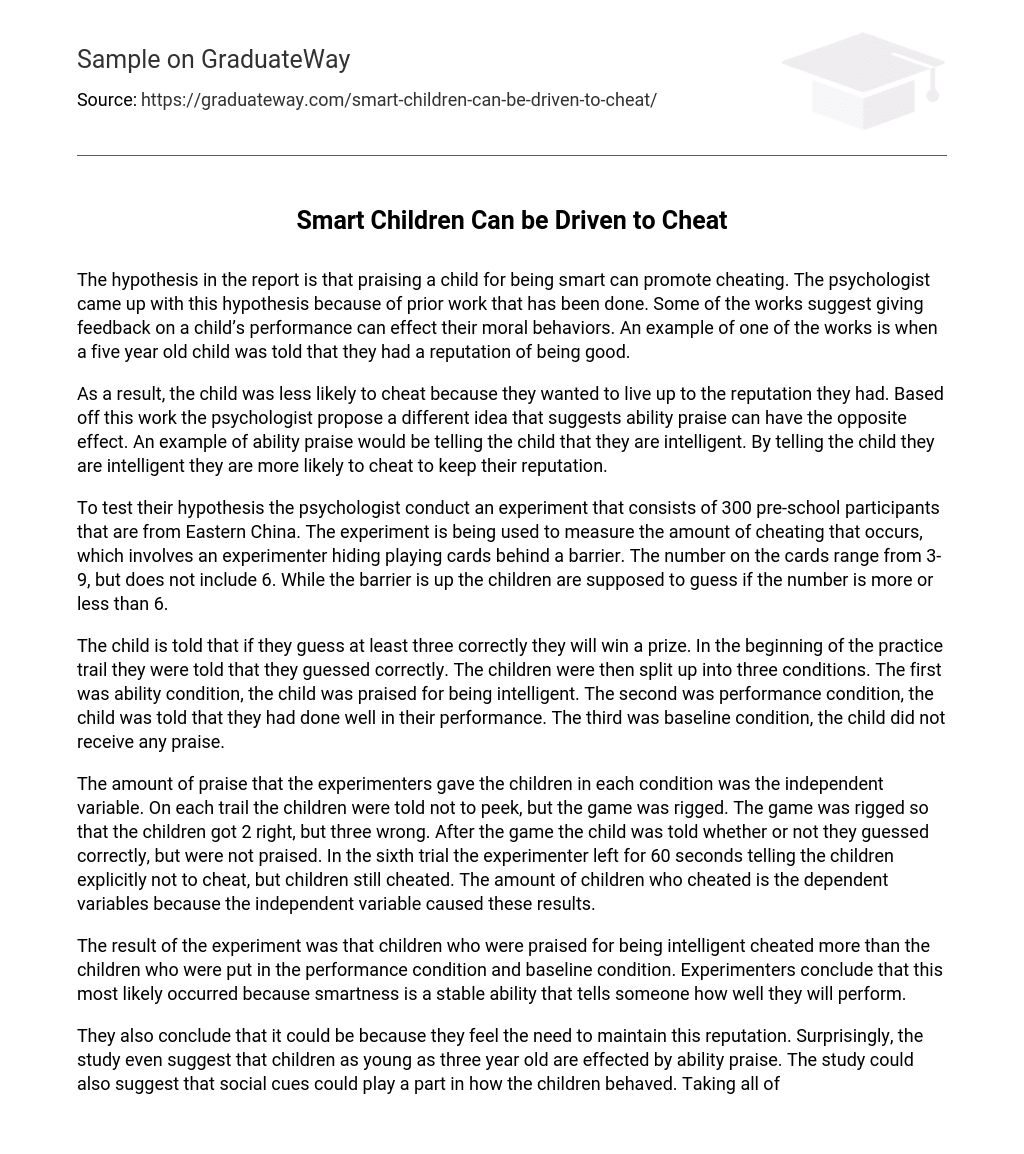The hypothesis in the report is that praising a child for being smart can promote cheating. The psychologist came up with this hypothesis because of prior work that has been done. Some of the works suggest giving feedback on a child’s performance can effect their moral behaviors. An example of one of the works is when a five year old child was told that they had a reputation of being good.
As a result, the child was less likely to cheat because they wanted to live up to the reputation they had. Based off this work the psychologist propose a different idea that suggests ability praise can have the opposite effect. An example of ability praise would be telling the child that they are intelligent. By telling the child they are intelligent they are more likely to cheat to keep their reputation.
To test their hypothesis the psychologist conduct an experiment that consists of 300 pre-school participants that are from Eastern China. The experiment is being used to measure the amount of cheating that occurs, which involves an experimenter hiding playing cards behind a barrier. The number on the cards range from 3-9, but does not include 6. While the barrier is up the children are supposed to guess if the number is more or less than 6.
The child is told that if they guess at least three correctly they will win a prize. In the beginning of the practice trail they were told that they guessed correctly. The children were then split up into three conditions. The first was ability condition, the child was praised for being intelligent. The second was performance condition, the child was told that they had done well in their performance. The third was baseline condition, the child did not receive any praise.
The amount of praise that the experimenters gave the children in each condition was the independent variable. On each trail the children were told not to peek, but the game was rigged. The game was rigged so that the children got 2 right, but three wrong. After the game the child was told whether or not they guessed correctly, but were not praised. In the sixth trial the experimenter left for 60 seconds telling the children explicitly not to cheat, but children still cheated. The amount of children who cheated is the dependent variables because the independent variable caused these results.
The result of the experiment was that children who were praised for being intelligent cheated more than the children who were put in the performance condition and baseline condition. Experimenters conclude that this most likely occurred because smartness is a stable ability that tells someone how well they will perform.
They also conclude that it could be because they feel the need to maintain this reputation. Surprisingly, the study even suggest that children as young as three year old are effected by ability praise. The study could also suggest that social cues could play a part in how the children behaved. Taking all of this into account I have concluded something about this study.
I believe that the conclusion and study is not strong because of several factors. One of those factors is that the study is not a random representative sample. This study only includes children from China although both genders are present this does not represent the population as a whole. The study also fails to have a meta-analysis because there are no previous experiment on this single topic.
There are experiments that prove the opposite of this position, but one single experiment can not provide a clear picture of what was observed in isolation. An objective perspective might have helped this study be more reliable, but it was not evident in the study. The experimenters already had an idea of what the results would be. When they were talking to the children in the ability condition group they might have used a different tone of voice than the they did with the children in the performance condition group. They could have talked more sweetly and encouraging to one group and less to another which could have caused the results of the experiment.
In the Psychology book Discovering Psychology: The Science of Mind, in chapter 13 it connects well with this study because the chapter focuses on social psychology. The children in this study wether the study be accurate or not could have been affected by what is called central route to persuasion. Persuasion alone can cause someone to change there attitude because of the information someone else has given them.
The children are young and still developing so when someone tells them something about their intelligence this persuades the child into thinking they possess this quality. The central route to persuasion is when the person internalizes this information and thinks about it thoughtfully. This persuasion causes them to think about themselves and how to interpret this new found information being presented to them.
Maybe the child might not cheat to keep this status, but instead become arrogant. Cheating will not be the behavior that all children posses because of this persuasion and praise. As I mentioned before their tone of voice could have changed the results and their bias view. Although I don’t find the study reliable I do think the concept is interesting and with further investing maybe it can be proven to be true.





